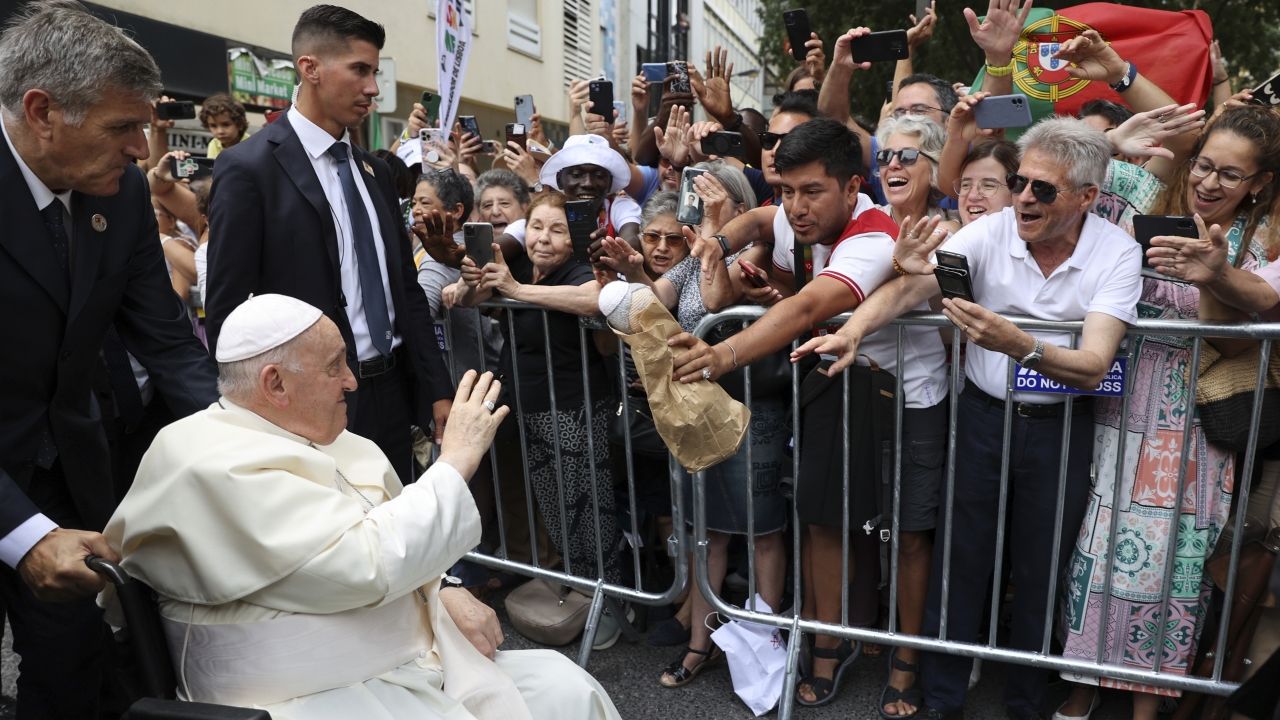Pope Francis met with survivors of clergy sexual abuse in Portugal on Wednesday and blasted members of the country’s Catholic hierarchy for their response to the long-ignored scandal, which he said had marred the Catholic Church and helped drive the faithful away.
Francis dove head-on into the crisis roiling the Portuguese church on the first day of a five-day visit to Lisbon for the Catholic Church's World Youth Day festival. His trip comes at a delicate moment for the Portuguese church; a panel of experts hired by Portugal's bishops reported in February that priests and other church personnel may have abuse at least 4,815 boys and girls since 1950.
The Vatican said Francis met with 13 abuse victims for more than an hour at the Vatican Embassy and characterized the pope's role in the meeting as one of "intense listening." The victims were accompanied by church personnel in charge of child protection programs.
The encounter, which had been expected since Francis met with survivors on previous trips abroad, was aimed at trying to help the Portuguese hierarchy and faithful come to terms with the church's own legacy of abuse and cover-up after many other European countries have gone through similar reckonings.
The response by Portugal’s bishops to the expert report’s findings, however, in some ways added to the problem. Prior to the report, Portuguese church officials had insisted there were only a handful of child sex abuse cases. After the document's release, the bishops initially refused to remove named abusers from ministry and said they would only compensate victims if courts ordered them to.
The meeting with victims took place after Francis presided over a vigil service for Portuguese clergy and nuns at the capital’s iconic Jeronimos Monastery, where in February hundreds of people gathered to brave for victims of sex abuse after the experts' report was released.
Speaking in his native Spanish, Francis acknowledged many clergy and nuns in countries with once-thriving Catholic parishes feel weary about their vocations because the faithful are increasingly detached from their faith.
"It is often accentuated by the disappointment and anger with which some people view the church, at times due to our poor witness and the scandals that have marred her face and call us to a humble and ongoing purification, starting with the anguished cry of the victims, who must always be accepted and listened to," he said.
Bishop Jose Ornelas, the head of the Portuguese Bishops' Conference, promised in a speech to Francis to devote "our special attention to the protection of the welfare of children and the undertaking to protect them from all kinds of abuse."
Although critics have chided church officials for their sluggish response, the bishops' conference later said the pope's meeting with abuse survivors was evidence of "the path of reconciliation that the Portuguese church has been following in this area."
Portugal's bishops are committed to "putting the victims first," and "working together" with victims on reparations and their recovery, a conference statement asserted.
The Portuguese Catholic Church also promised in March to build a memorial to victims that would be unveiled during World Youth Day, but organizers scrapped the plan a few weeks ago.
In its place, victims' advocates launched a campaign called "This is our memorial." Hours before the pope arrived, they put up a billboard in central Lisbon reading "4,800+ Children Abused by the Catholic Church in Portugal." They said it was paid for through a crowdfunding campaign that was so successful the organizers can put up more billboards around the city, though none was located along planned routes for his visit.
Reaction to Francis' comments on abuse were mixed: some pilgrims outside the Jeronimos Monastery said the World Youth Day gathering wasn't the time or place to raise the issue.
Giovanni, a 47-year-old pilgrim from Italy who declined to give his last name, said it was clear that people who come from around the world to attend the event "don't like bad things. We definitely hope whatever is clear that is wrong will be stopped and canceled."
But he noted that the pope had requested forgiveness for the church's legacy of child sex abuse "and it also shows his commitment to solve this issue as well."
Francis came to Lisbon to participate in his fourth World Youth Day, the raucous Catholic jamboree launched by St. John Paul II in the 1980s to invigorate the next generation of Catholics in their faith. More than 1 million young people from around the world were expected to attend the events in Lisbon, which run through Sunday.
As he was traveling to Portugal, the pope said he would continue urging young people to "make a mess" – a reference to his now-famous exhortation during his first World Youth Day as pontiff, in Rio de Janeiro in 2013. It was a call for young people to shake things up in their parishes and has come to symbolize Francis’ own revolutionary reforms that have shaken up the Catholic Church at large.
Francis’ first stop in Portugal was at the Belem National Palace, the official presidential residence in an area west of Lisbon from where Portugal’s maritime explorers of the 15th and 16th centuries set sail. Addressing Portuguese government authorities and the diplomatic corps at a nearby conference center, the pope referred to Portugal’s sea-faring history, its place in Europe and its openness to others.
"We are sailing amid storms on the ocean of history, and we sense the need for courageous courses of peace,” he said. “It is my hope that World Youth Day will be, for the ‘Old Continent,’ the aged continent, an impulse towards universal openness."
Citing Russia’s war in Ukraine, global warming and Europe’s aging population, he urged young people in particular to take up the mantle to build a future together.
"I dream of a Europe, the heart of the West, which employs its immense talents to settling conflicts and lighting lamps of hope," Francis said.







